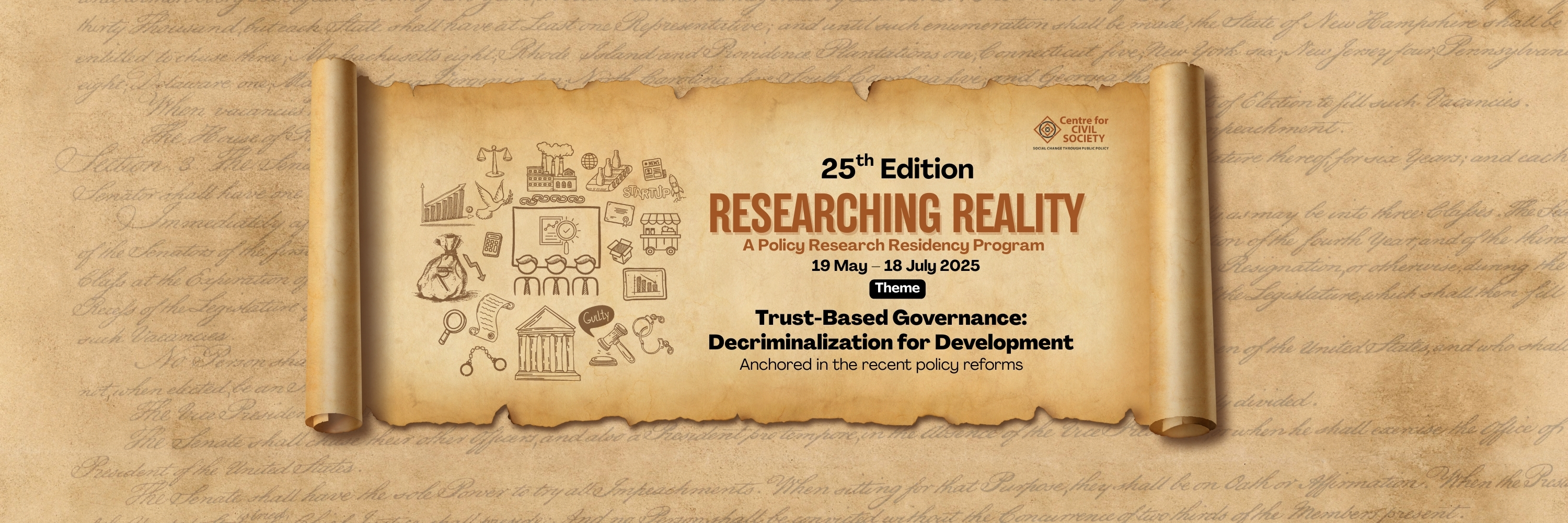Are you an undergraduate or recent graduate passionate about public policy, governance, or economic law reform? Apply now for the 25th edition of CCS’s flagship policy research training – Researching Reality 2025!
What is Researching Reality?
Researching Reality is the Centre for Civil Society’s annual flagship public policy research training program, offering eight weeks of immersive learning, research, and mentorship. Regarded as one of India’s premier policy research residency programs, it is designed for undergraduate students and fresh graduates who are keen to build careers in law, economics, policy analysis, governance, or social impact sectors.
Over the last 24 years, this program has equipped aspiring researchers with critical tools to understand, evaluate, and influence India’s policy landscape. In 2025, we are proud to present the 25th edition of Researching Reality.
Theme for 2025: Trust-Based Governance – Decriminalization for Development
India’s regulatory landscape is undergoing a transformation. The introduction of the Jan Vishwas Bill 2.0, announced by Finance Minister Nirmala Sitharaman in the Union Budget 2025-2026, reflects a bold move towards decriminalizing minor economic infractions.
This bill aims to:
- Promote ease of doing business,
- Encourage voluntary compliance,
- Foster entrepreneurship and innovation, and
- Strengthen a trust-based governance model.
Building on CCS’s ongoing Repeal of Laws initiative, Researching Reality 2025 will focus on analyzing outdated, redundant, or overly punitive economic laws that hinder development. Scholars will evaluate how legal reforms can unlock growth, enhance accountability, and support a more enabling regulatory environment.You can also read more about our previous compendiums here.
Program Dates & Location
Duration: 19 May – 18 July 2025
Location: Centre for Civil Society, Hauz Khas, New Delhi
Commitment: In-person | Full-time | 40 hours/week
Who Can Apply?
Eligibility Criteria:
- Undergraduate students or recent graduates in Law, Economics, Public Policy, Education, Social Sciences, or related disciplines.
- Demonstrated interest in public policy, governance, law reform, or field research.
- Strong analytical, writing, and communication skills in English and Hindi.
- Availability to attend the full-time, in-person residency in New Delhi.
Why Join Researching Reality?
Rigorous Research Training
40+ hours of expert-led sessions in qualitative and quantitative research, policy analysis, data visualization, and fieldwork design.
Mentorship & Guidance
Work closely with experienced researchers and policy practitioners throughout your residency.
Policy Publication
Contribute to a published research compendium and co-author a policy research essay on India’s regulatory reforms.
Enriching Community
Engage in weekly reading groups, policy roundtables, and knowledge-sharing sessions with CCS’s wider research community.
About Centre for Civil Society (CCS)
The Centre for Civil Society is India’s leading think tank advocating for freedom, choice, and accountability in policy-making. Through research, outreach, and education, CCS works towards transforming India’s legal and regulatory frameworks to enhance individual liberty and institutional effectiveness.
-
What facilities will be available to me?
You will receive access to our extensive library and network of scholars.
-
Does CCS provide accommodation for outstation applicants?
The scholars are requested to make their own living arrangements in New Delhi for the training period.
-
Will I be working in a group or individually?
All scholars will work in groups of 3-4 members. Peer learning is a crucial part of the training program.
-
Is CCS flexible with the timeline of the program?
While April and May are self paced and flexible, June and July are full-time in Delhi. We are unable to offer flexibility during those two months. August would focus on wrapping up the capstone project; it would be remote and part-time.
